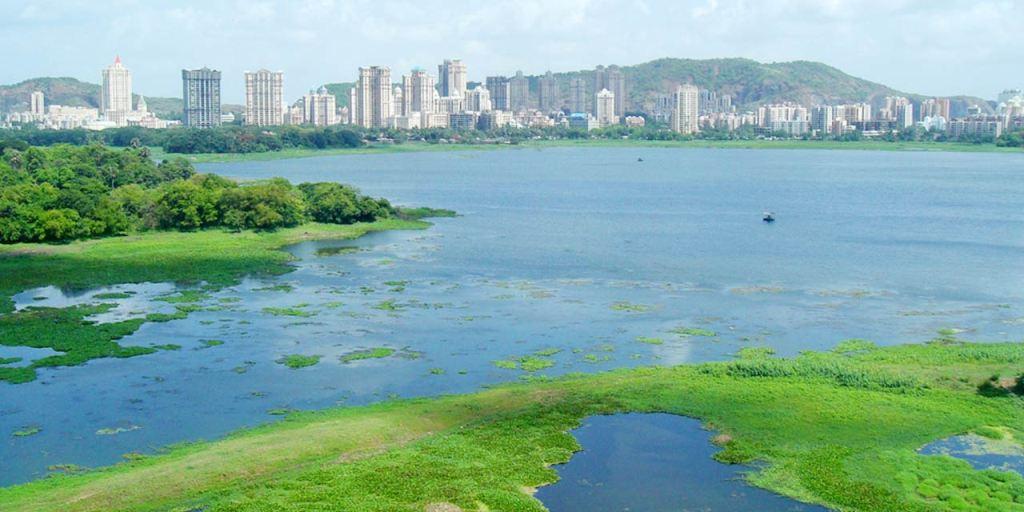While removing the hyacinth from Powai Lake, consideration of the bird nesting and nesting season has led to the temporary halting of work on the Pipeline Road and IIT Mumbai side until 10th June 2024. However, the work continues to remove water hyacinth along Adi Shankaracharya Road.
Recently, a joint inspection of hyacinth removal work at Powai Lake was conducted by BMC officials, along with office-bearers from the Bombay Natural History Society. Taking into account the suggestions from bird observers and researchers, BMC has rescheduled the hyacinth removal to protect and conserve the natural habitat.
Under the Project for Natural Conservation and Rejuvenation of Powai Lake, the Brihanmumbai Municipal Corporation (BMC) is in the process of removing hyacinth and floating vegetation from the lake. A total of about 24,985 metric tonnes of hyacinth is estimated to be removed. Of this, about 13,920 metric tonnes (55 percent) have been removed to date (22nd May 2024).
Meanwhile, the BMC has also taken precautions to protect and conserve natural elements while removing hyacinth. As a part of this, in view of the birds’ nests and their nesting season, the work of removing the hyacinth adjacent to the Pipeline Road and Indian Institute of Technology, Mumbai, has been temporarily put on hold until 10th June 2024. However, the process of removing the hyacinth on the Adi Shankaracharya Road side is ongoing continuously, as no nests were found on that side.
As the removal of water hyacinth from Powai Lake began, suggestions from nature researchers and bird watchers were well taken into account. On Saturday, 18th May 2024, BMC officials and office-bearers from the Bombay Natural History Society Institute inspected the lake vicinity to ensure that these suggestions could be implemented.
Following the inspection, a site report with important observations was submitted to the municipal administration. According to the report, the nesting season of birds at Powai Lake normally lasts until 10th June 2024.
Bird nests were mainly found along the Pipeline Road and Indian Institute of Technology (IIT), Mumbai. Therefore, bird watchers and nature researchers requested that work to remove hyacinth from this area be postponed until the nesting season ends. Acknowledging this request, BMC has temporarily halted work on that side, which will resume after 10th June 2024. However, since bird habitats were not found on the side along Adi Shankaracharya Road, the removal work of water hyacinth on that side has continued uninterrupted.
Municipal Commissioner and Administrator Bhushan Gagrani recently visited the Powai Lake area to inspect the measures taken, especially the process initiated to remove hyacinth from the lake. During the visit, Gagrani suggested involving nature researchers to protect and preserve natural habitats while undertaking the action. The municipal administration has acted upon this suggestion accordingly.
According to the observations of bird watchers and nature researchers, the period up to 10th June every year is typically recognized as the nesting season of aquatic birds. Researchers have duly noted that the removal of hyacinth could disrupt the incubation of eggs laid by aquatic birds and crocodiles, thereby risking their natural habitat. Taking immediate cognizance of this, the municipal administration has enlisted the expertise of the Bombay Natural History Society. An expert in this matter, the institute was contacted and requested to visit the site in person and submit a report.
Later, key office-bearers of the Bombay Natural History Society, along with birdwatchers and BMC officials, visited Powai Lake and inspected various areas, including the Pipeline Road, Westin side, Ganesh Ghat, Pawarwadi Ghat, and IIT, Mumbai side. A report regarding the findings was subsequently submitted to the municipal administration.
The inspection team comprised Bombay Natural History Society’s Governing Board Member Shri Debi Goenka, Deputy Director Shri Rahul Khot, and birdwatchers and residents of Powai, Smt. Maitreyi and Smt. Usha Noorni.
The work of removing hyacinth and other floating vegetation from the lake involves removing and disposing of them in the landfill. It has been conveyed to the members of the Bombay Natural History Society by the BMC that this process does not encompass the removal of silt from the lake or the clearing of shrubs from the bank.
During the inspection of Powai Lake along the Pipeline Road, habitats of Black-winged Stilts, Egrets, Jacanas, Swamphens, Lapwings, and Whistling Ducks were discovered. It was observed that the use of harvester machines to remove water at this location may cause disturbance to the habitat of aquatic birds.
At Ganesh Ghat, the lake was found clean. Conditions conducive to the habitat of aquatic animals, such as shrubs and plants, were observed on the banks of the lake. The shrubs and floating vegetation along the banks of the lake provide suitable habitat and nesting sites for aquatic birds. Local birdwatchers discovered a nest of birds on the lake’s edge. Therefore, nature researchers have requested that the municipal administration use a harvester machine instead of a poclain machine to ensure the safety of the nests while removing hyacinth. The administration has positively adopted this suggestion too.
Meanwhile, the researchers noted that bird nests are being threatened by stray dogs and other animals. In light of this, the Bombay Natural History Society has requested the municipal administration to take necessary measures. It has been assured that the concerned department will be informed to take appropriate action on this issue.
The process of removing hyacinth from Powai Lake has been ongoing since 8th March 2024. According to the work order, approximately 24,985 metric tonnes of hyacinth is expected to be removed. As of 22nd May 2024, about 13,920 metric tonnes, or roughly 55 percent, of hyacinth have been successfully removed and transported to the dumping ground.


